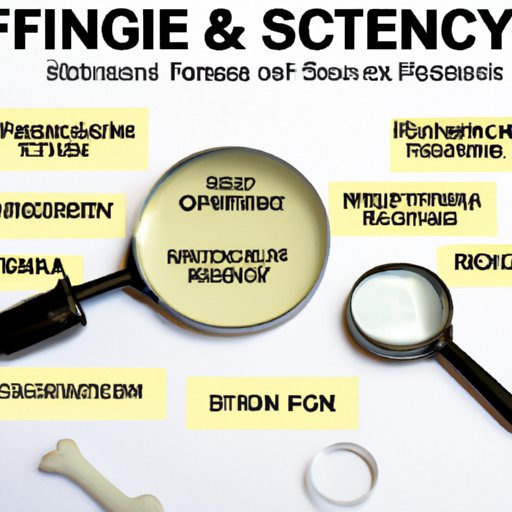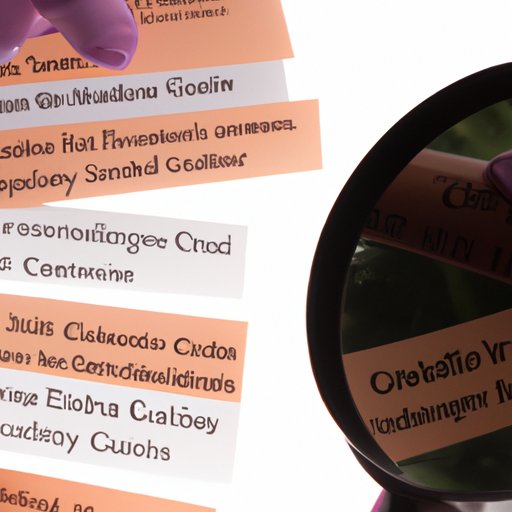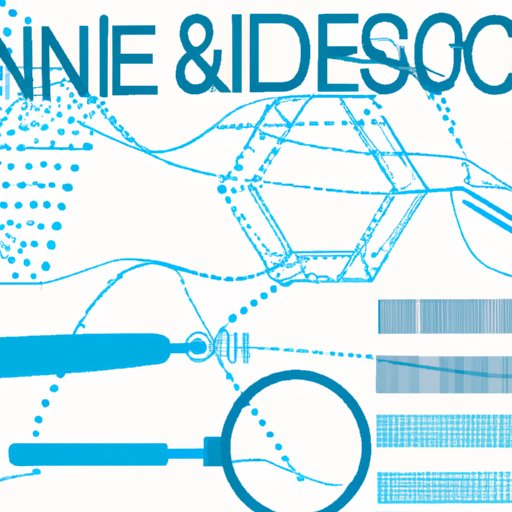Introduction
Forensic science is a field of science that uses scientific principles and techniques to investigate crimes. It involves the analysis of evidence to determine the facts of a criminal case. It has been used in law enforcement since the 19th century and has become an integral part of the criminal justice system in modern times. In this article, we will explore what forensic science is, its key principles and processes, the role of forensic science in solving crimes, the different disciplines of forensic science, its history, its use in popular culture, advances in technology, and how to become a forensic scientist.

An Overview of Forensic Science
Forensic science is the application of scientific knowledge and techniques to the investigation of crime and the administration of justice. It is a multidisciplinary field that combines elements of biology, chemistry, physics, and other sciences to analyze evidence from a crime scene. Forensic scientists use a variety of methods to examine physical evidence and reconstruct events that occurred at the scene of the crime.
What is Forensic Science?
Forensic science is the application of scientific principles and techniques to the investigation of crime and the administration of justice. It is used to analyze physical evidence from a crime scene and can include such things as blood spatter analysis, fingerprinting, DNA analysis, toxicology, ballistics, and other forms of evidence examination. Forensic science can also be used to identify criminals through various methods such as facial recognition software and handwriting analysis. Forensic scientists are often called upon to testify in court and provide expert testimony on their findings.
Key Principles and Processes
Forensic science is based on the principle of collecting, preserving, and analyzing physical evidence from a crime scene. This evidence can include fingerprints, bodily fluids, weapons, and other items found at the scene. The process of examining this evidence includes collecting it, preserving it, analyzing it, and presenting it in court. Forensic scientists must use careful observation, documentation, and reasoning to draw conclusions about the evidence.
The Role of Forensic Science in Solving Crimes
Forensic science plays a crucial role in solving crimes. By analyzing physical evidence, forensic scientists can link suspects to a crime scene, help establish timelines for events, and provide insight into the perpetrator’s behavior and motivations. Forensic science can also be used to exonerate innocent suspects and can be instrumental in convicting guilty parties. According to a study published by the National Institute of Justice, “Forensic science has made tremendous strides in recent years and is now considered essential in the successful prosecution of many crimes.”

The Different Disciplines of Forensic Science
Forensic science is divided into several different disciplines, each of which focuses on a particular type of evidence. These disciplines include biology, chemistry, physics, and digital forensics.
Biology
Biological forensics involves the examination of biological material such as blood, hair, and other body fluids to identify a suspect or victim. It can also be used to determine the cause of death or to identify genetic markers that may be linked to a certain individual. Biological evidence can be used to link a suspect to a crime scene or to prove that a suspect was present at the scene.
Chemistry
Chemical forensics focuses on the chemical analysis of evidence such as explosives, drugs, and poisons. It can be used to trace the origin of a substance or to determine the presence of a particular type of substance at the scene of a crime. Chemical evidence can also be used to identify the perpetrator of a crime.
Physics
Physical forensics involves the examination of physical evidence such as fingerprints, bullets, and footprints. It can be used to link a suspect to a crime scene or to identify the weapon used in a crime. Physical evidence can also be used to determine the speed of a vehicle or the trajectory of a bullet.
Digital Forensics
Digital forensics is the process of examining digital evidence such as computer files, emails, and text messages to identify and analyze digital activity related to a crime. Digital evidence can be used to track down suspects, uncover hidden networks, and provide insight into the motives behind a crime. Digital forensics is a rapidly growing field that is becoming increasingly important in the investigation of cybercrimes.
Exploring the History of Forensic Science
The use of forensic science dates back centuries. Ancient civilizations used basic science to solve crimes, but it was not until the 19th century that modern forensic science emerged. Here, we will take a look at the early use of forensic science and the development of modern forensic science.
Early Use of Forensic Science
The earliest known use of forensic science can be traced back to ancient China, where a book written in 1247 AD documented the use of fingerprints to identify criminals. In the 16th century, Italian physician and scientist Girolamo Fracastoro wrote a book describing the use of medical evidence to solve crimes. Throughout the 18th and 19th centuries, advances in science led to the development of more sophisticated methods of crime-solving, such as the use of ballistics, toxicology, and bloodstain pattern analysis.
Development of Modern Forensic Science
The development of modern forensic science began in the late 19th century with the work of British doctor Sir Bernard Spilsbury. Spilsbury pioneered the use of forensic pathology to identify victims and solve crimes. He was also one of the first to recognize the importance of microscopic evidence in criminal investigations. In the early 20th century, other advancements in forensic science included the development of fingerprinting, lie detector tests, and DNA analysis.
Forensic Science in Popular Culture
Forensic science has been featured prominently in popular culture, including television shows, movies, books, and novels. This has helped to make forensic science more accessible to the public and has also helped to raise awareness of its importance in crime-solving.
Television and Movies
Forensic science has been featured in many television shows and movies over the years. Some of the most popular examples include CSI: Crime Scene Investigation, Bones, and NCIS. These shows have helped to popularize the idea of using forensic science to solve crimes and have helped to educate the public about its importance.
Books and Novels
Forensic science has also been featured in many books and novels, including those written by authors such as Patricia Cornwell, Kathy Reichs, and Michael Connelly. These works of fiction often focus on the use of forensic science to solve crimes and can help to further educate readers about the field.
Technology and Forensic Science
Advances in technology have had a major impact on the field of forensic science. Technological innovations have allowed forensic scientists to analyze evidence more quickly and accurately, leading to faster and more efficient crime-solving.
Advances in Technology
In recent years, there have been significant advances in technology that have had a profound effect on forensic science. For example, the development of DNA analysis has revolutionized the field, allowing forensic scientists to identify suspects with greater accuracy than ever before. Advances in computer technology have also allowed forensic scientists to analyze digital evidence more quickly and efficiently.
Implications for Forensic Science
The advances in technology have had a major impact on forensic science. They have allowed forensic scientists to analyze evidence more quickly and accurately, leading to faster and more efficient crime-solving. Technology has also made it easier for forensic scientists to share information and collaborate with other experts in the field, resulting in better results.

How to Become a Forensic Scientist
If you are interested in pursuing a career in forensic science, there are several steps you need to take. Here, we will discuss the educational requirements and career opportunities for aspiring forensic scientists.
Educational Requirements
To become a forensic scientist, you must have at least a bachelor’s degree in a natural science such as biology, chemistry, or physics. You may also need to complete additional coursework in forensic science or criminal justice. Additionally, you may need to gain experience in the field through internships or volunteer work.
Career Opportunities
Once you have the necessary education and experience, you can pursue a career in forensic science. There are a variety of job opportunities available, including positions in law enforcement, crime laboratories, and private companies. The job outlook for forensic scientists is positive, with the Bureau of Labor Statistics predicting an 11% increase in employment between 2018 and 2028.
Conclusion
Forensic science is a field of science that uses scientific principles and techniques to investigate crimes. It combines elements of biology, chemistry, physics, and other sciences to analyze evidence from a crime scene. Forensic science has been used in law enforcement since the 19th century and has become an integral part of the criminal justice system in modern times. Advances in technology have allowed forensic scientists to analyze evidence more quickly and accurately, leading to faster and more efficient crime-solving. To become a forensic scientist, you must have at least a bachelor’s degree in a natural science and may need to complete additional coursework in forensic science or criminal justice. The job outlook for forensic scientists is positive, with the Bureau of Labor Statistics predicting an 11% increase in employment between 2018 and 2028.
(Note: Is this article not meeting your expectations? Do you have knowledge or insights to share? Unlock new opportunities and expand your reach by joining our authors team. Click Registration to join us and share your expertise with our readers.)
